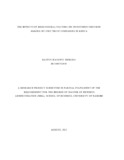| dc.description.abstract | Behavioral finance attempts to investigate the psychological and sociological issues that influence investment decision making process of individual and institutions. It also considers how various psychological traits affect how individuals or groups act as investors, analysts, and portfolio manager. The study investigated the effects of behavioral factors on investment decisions making by unit trust companies in Kenya. Literature has documented that individual and even institutional investors have embraced heuristics in their investment decision making. The study therefore sought to establish whether heuristics (overconfidence behavior, herd behavior, and anchoring behavior) affect investment decisions in unit trusts.
Descriptive design study was used through census survey of eleven unit trust companies. Semi structured questionnaire was used for data collection with 100% response rate being registered. Drop and pick later method was used to distribute the questionnaires. Analysis was done using Statistical Packages for Social Scientists. Descriptive statistics and correlation analysis were used to summarize the research findings.
The study established that unit trusts’ investment decisions are affected by overconfidence, herd, and anchoring behaviors. Unit trust managers tend to be overconfident while making investment decisions. Their decisions are also affected by experience of their past performance suggesting the effect of anchoring. Herd behavior is not common among the unit trust manager as most of them prefer making their own decisions. According to the findings, managers who are overconfident are also likely to follow the masses in decision making.
Behavioral finance models are not empirically supported and therefore should not be used in isolation for investment analysis by unit trusts. Investors on the other hand should be cognizance of the fact that fund managers are not immune from behavioral biases while making investment decisions. They should therefore closely monitor their investments’ performance and actions of fund managers to ensure that these biases are eliminated. | en |

